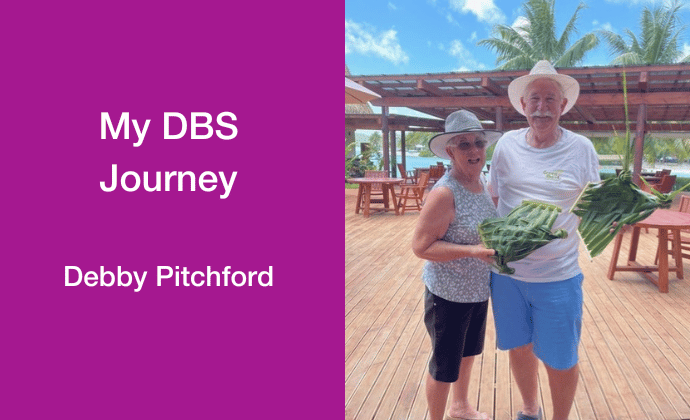“When my very intuitive three-year-old granddaughter asked me why her nan shook all the time, it made me get serious about Deep Brain Stimulation,” recalls Debby Pitchford, who lives with her husband Keith in Tathra, on the south coast of New South Wales.
Debby and Keith grew up in the Wollongong region, living and working there until moving to Tathra in 2015. It was about the time that Debby retired from full-time teaching that she began to have a series of falls, among them a broken foot and broken wrist.
After one particularly bad fall dislocated her shoulder in 2010, Debby’s family doctor treated her with pain killers and physiotherapy. Over the next year the local Wollongong medical advice and intense physio treatment was not effective at improving her muscle function and so her GP suggested specialist intervention.
“He referred me to a neurologist in Wollongong and I was diagnosed with Parkinson’s Disease within a few minutes on my first consultation,” says Debby.
”I was 61 years old and it was devastating news, but Parkinson’s wasn’t a complete surprise as my mother had it and she lived with Parkinson’s for more than 20 years, until she was 92. I was pretty upset but I knew the disease progresses differently in everyone.
“I was fortunate that my neurologist was a Movement Disorder specialist neurologist, and a fairly conservative one when it came to prescribing medication. Initially, I responded well to the medication but I was on a low dose of Levodopa. When I asked why so low, my neurologist replied, “I can give you a high dose of medication now, and you’ll feel great for a while, but you will come to hate me in the long run. The effectiveness of the drug will lessen over time.”
Need to better control symptoms
Her family adjusted to the news and continued with their busy lives, but as the years passed Debby felt she needed to be able to better control her symptoms without the ever-changing swings in the ‘on’ and ‘off’ periods each day.
“My little granddaughter’s comment really made me think,” says Debby. “I also knew that my family and friends had trouble reading my emotions because Parkinson’s can cause ‘masking’. Facial muscles don’t work as well and your expression isn’t easily seen. On the inside I felt like I was smiling, but people didn’t see that. I was becoming more stressed as my drugs wore off during the day and the night terrors became worse. It was time to look at a new approach to better handle my Parkinson’s.
“I had an excellent Movement Disorder specialist and he encouraged me to investigate DBS surgery. After consultation with a DBS Movement Disorder specialist neurologist and a DBS surgeon, I felt that this was the right step for me. A few more consultations and an interesting psychiatric interview later, I was prepped and ready for the big day at Westmead Hospital in June 2021.
“The hospital operating theatre staff were wonderful. While they attached the special frame around my head I listened to my favourite Queen songs, and even had someone ready to scratch my nose because I wasn’t able to move very much at this stage. I couldn’t see what was going on and could barely hear the drill as the surgical team went about the procedure.
“There was absolutely no pain and I was feeling pretty good until I heard one of the surgeons say ‘Well, that’s that side done, now for the other side’! It was ‘lights out’ when the surgical team implanted the neurostimulator and I spent a bit of a restless night in ICU until the next day. A visit from the DBS neurologist and the surgeon then confirmed that all had gone well and 24 hours later I got to be ‘switched on’.
“I opted for the rechargeable type of implanted neurostimulator as I believed I wouldn’t have to worry about a battery replacement operation for another 15 years or so. All that was four years ago. I always say that the DBS surgery was ‘one day out of my life that makes every other day possible’. I would do it again in a heartbeat!.
DBS technology is amazing
“The DBS technology is amazing. I have complete control over adjusting the stimulation settings as necessary. I only have to visit the DBS clinic at Westmead once per year and they are only a phone call away if I have any concerns about how I’m feeling, or if I notice any changes in my Parkinson’s.
“My DBS Movement Disorder specialist neurologist was able to reduce my medication by 60 per cent after the surgery, and while I don’t know what the future will bring, it’s made things so much better for me now. I play golf twice a week, and I only took that up during Covid.
“I also exercise and walk three days a week and I do sewing for a fundraising group. I’ve been very lucky with how things are. I aim for a positive attitude and a determination to never to give up or give in to the Parkinson’s.”
At a recent Parkinson’s conference, Debby says she was quite touched when someone asked her who had Parkinson’s; her or her husband?
“I know it’s hard and the disease progresses differently for everyone, which is where I’ve been very lucky,” says Debby. “I say that I have Parkinson’s, but It doesn’t have me.”
Debby’s husband Keith, secretary to the Bega Valley Parkinson’s Support Group, says he sees the big change DBS has made for them.
“I don’t see Deb going through daily mood and motor fluctuations and I don’t even think about it now,” he says. “I’m guilty of forgetting she has Parkinson’s. We’re doing now what we hoped we’d be doing, enjoying retirement and visiting kids and grandkids. We celebrated our golden wedding anniversary in the Cook Islands last year.”
Tips on preparing for DBS surgery
Debby’s tips for anyone preparing for Deep Brain Stimulation surgery are:
- Find a good Movement Disorder specialist neurologist and ask lots of questions
- Don’t assume you’re too old for DBS
- Relax and be kind to yourself (have a massage, take a long bath, enjoy a date night)
- Don’t be afraid to tell your story. Listen, too; most people know someone who has Parkinson’s
- Stay positive, mental attitude is important. It’s understandable to ask ‘why me’ but it’s not helpful
- Exercise regularly; it’s a great way to improve social interaction and stay committed. It also shows you are ARE committed. Once you’ve had DBS there is a commitment.
- Ask questions; stay informed









